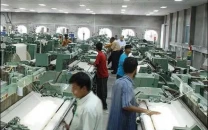Plunging into the abyss of financial catastrophe
NEPRA has been dropping bombshells, approving raise demanded in electricity prices

The National Electric Power Regulator (NEPRA) has been dropping bombshells, approving the raise demanded in electricity prices — like the recent Rs3 per unit while determining fuel costs for October 2023. Moreover, according to a petition filed by the Central Power Purchasing Agency (CPPA), electricity prices for November 2023 are likely to increase by Rs4.66 per unit. This continuous hike in electricity price is forcing consumers to use less electricity, which is one of the main reasons behind a remarkable decline in consumption. Another one is that consumers are rapidly switching to rooftop solar systems.
This comes at a time when Pakistan is struggling to contain public anger over soaring electricity bills and the government’s options are limited due to commitments made to the IMF. It shocking to see that in the same month of October 2023, three flagship coal power plants with a combined installed capacity of 4000 megawatts only contributed 49 million units to the national grid. In contrast, the same power plants in October 2019 and the same fleet of coal power plants generated 2008 million units. The electricity consumption in October 2023 shows that only 0.03% of the utilisation factors of these coal power plants mean another phenomenal increase in the already huge capacity payments — a major component of the galloping circular debt. A few days back, the capacity charges as of September 2023 stood at Rs2.3 trillion, according to the Ministry of Power. Now closure of these coal power plants will cause a phenomenal increase in capacity payments.
Using October 2023 as a baseline, let’s compare the growth of electricity consumption patterns in India and Pakistan. In India, a 22% increase in power consumption was witnessed in October 2023 in contrast with October 2021, indicating a spike in demand for electricity brought on by the country’s festivities and heightened economic activity. While Pakistan experienced roughly 18% decrease in electricity consumption over two years.
One of the main causes of this phenomenal increase in electricity price is capacity payment. As agreed, the government has to make capacity payments to the power plant even if no electricity is generated or purchased. This is because of uneven growth in installed capacity, which ignores consumption, demonstrating that all organisations involved in the electricity sector are operating on autopilot, blindly adding more and more power plants. Pakistan is lagging behind India by nearly 37% when comparing the ratio between the installed capacity and the electricity generation. What astounding figures: with 40,124 megawatts of installed capacity, 9.6 billion units of electricity were generated in October 2023, compared to 34,982 megawatts of installed capacity in 2019 that generated 11 billion units of electricity. The professionalism of the entire team of experts and officials at the Planning Commission, the Ministry and NEPRA comes into question by this excessively large gap.
Low consumption was the result of the ongoing power price increases. One primary cause of the price increase is the high cost of electricity generation at the coal-fired power plants that are the centerpiece of CPEC. Understanding it is simple. Selection technology enables these coal-fired power plants to generate expensive electricity. Our planner neglected to utilise the most recent technology available when negotiating costs and technology with our all-weather friend. It is untrue that our planner is cognizant of the most recent technological advancements.
Let’s recall the meeting organised by Research and Development International (RANDI) in China before the official announcement of CPEC. In this initial meeting, the then Minister of Planning made it clear that Pakistan was eager to install coal-fired power plants, viewing them as the solution to the country’s electricity shortage and high electricity generation costs using furnace oil. During the same visit I met various coal power plant manufacturers. I found that globally China is the largest manufacturer of state-of-the-art coal power plants, so top manufacturers have shared the brochures of latest clean coal technologies. Based on the briefing, I had released a policy brief, titled Coal-fired Power Generation in Pakistan, well before the start of negotiation. This policy brief is available at the Google Book Store. I have clearly and unequivocally recommended using ultra-super critical technology to install coal power plants in this policy brief as well as in letters to the Prime Minister, the Planning Commission and NEPRA.
Installing coal power plants having high efficiency and low emissions coal-fired power generation is ultra-super critical technology. With an efficiency of 45%, ultra-super critical coal power plants produce the same amount of electricity while using less coal, releasing less carbon into the atmosphere, using less water and taking up less space. There were 165 ultra-supercritical power plants in operation worldwide as of August 2013. Consumers would have experienced significant relief if ultra-super critical plants had been selected because electricity would be more affordably produced.
While Bangladesh did a good job conceptualising this policy brief installing Payra 1320 MW Thermal Power Plant completed by China having efficiency of 44.29%. This demonstrates the disparity in the institutional capacities of the two South Asian nations.
The government’s decision to select coal power plants with an efficiency of less than 39% resulted in widespread public unrest due to unaffordable electricity bills. But when these plants were imported, the Minister of Planning claimed that these coal projects would be a game-changer. To the contrary, these power projects only brought about the collapse of Pakistan’s economy.
Published in The Express Tribune, January 1st, 2024.
Like Opinion & Editorial on Facebook, follow @ETOpEd on Twitter to receive all updates on all our daily pieces.












1726134115-0/BeFunk_-(41)1726134115-0-208x130.webp)



COMMENTS
Comments are moderated and generally will be posted if they are on-topic and not abusive.
For more information, please see our Comments FAQ